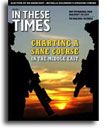Drug War: More Details on Medicated Troops in Combat
 The June issue of Chicago-based In These Times magazine provides additional details on an issue with a whole host of consequences: sending troops diagnosed with PTSD back into combat -- medicated. Although the story's been reported in a number of areas the past couple of months (here, here, and here), more attention is needed on this important troop health issue.
The June issue of Chicago-based In These Times magazine provides additional details on an issue with a whole host of consequences: sending troops diagnosed with PTSD back into combat -- medicated. Although the story's been reported in a number of areas the past couple of months (here, here, and here), more attention is needed on this important troop health issue.
Click on 'Article Link' below tags for more...
From In These Times:In Iraq and Afghanistan, when “suck it up” fails to snap a soldier out of depression or panic, the Army turns to drugs. “Soldiers I talked to were receiving bags of antidepressants and sleeping meds in Iraq, but not the trauma care they needed,” says Steve Robinson, a Defense Department intelligence analyst during the Clinton administration.
Sometimes sleeping pills, antidepressants and tranquilizers are prescribed by qualified personnel. Sometimes not. Sgt. Georg Anderas Pogany told Salon that after he broke down in Iraq, his team sergeant told him “to pull himself together, gave him two Ambien, a prescription sleep aid, and ordered him to sleep.”
Other soldiers self-medicate. “We were so junked out on Valium, we had no emotions anymore,” Iraq vet John Crawford told “Fresh Air” host Terry Gross. He and others in his unit in Iraq became addicted to Valium.
The issues around mental health and medication are exacerbated for the more than 378,000 troops who have served multiple tours to Iraq and Afghanistan. Post traumatic stress disorders (PTSD) caused by a previous tour are cropping up in later ones. “It concerns us when we hear military doctors say, ‘It’s wonderful that we have these drugs available to cope with second or third deployments,’” Joyce Raezer of the National Military Family Association told In These Times. “But that statement makes military spouses cringe,” she continues, “Soldiers are saying ‘we don’t have time to recover.’”
Marine psychiatrist Cmdr. Paul S. Hammer confirmed to San Diego Union-Tribune reporter Rick Rogers that Marines with PTSD are returning to Iraq. In many cases, their problem is labeled stress. “Army docs have told me that commanders pressured them not to diagnose PTSD because it would cut into combat power—the ability to project men and women into war,” says Robinson. “The docs admit that the decision [to misdiagnose] is unethical, but are unwilling to take the huge career risk of becoming a whistle blower.”
Related to this multiple deployment issue may be the 'ethics on the battlefield' training sessions the DOD has ordered up for all combat troops. It may be too early to tell what caused Marines in Haditha, Iraq to apparently lash out at civilians following the loss of one of their troops last year; but, reports indicate that the unit in question was in Iraq on its third combat deployment.
From AP:[Howard] Prince, [director of the Center for Ethical Leadership at the University of Texas at Austin and a retired Army general] also blamed a "revolving door" deployment policy that has worn on U.S. troops on their second and third tours in Iraq. The accused Marine battalion was on its third tour in less than 2 1/2 years. In comparison to the 10-year Vietnam conflict, most troops then only did two tours, Prince said.
"Repeated deployments have a cumulative effect on people's ability to maintain moral judgment, tactic standards," said Prince. "Leaders have to be aware of the cumulative, longterm effects of repeated deployments into this highly stressful and danger situation out there. We're wearing out our vounteer Army and Marines is what we're doing. And that's because the services are too small."
Back to the In These Times piece:[T]he use of brain-altering medications must be monitored for effectiveness and safety, which is beyond the Army’s capability in Iraq. The medications can take weeks to kick in, dangerously interact with other medications or fail to work at all. Side effects can include organ damage and thoughts of suicide.
But if the problem is bad for the occupying army, it is far worse for the Iraqi civilians, who have few medical resources and no end in sight to the constant fear and deprivation that occupation has brought. “The [Iraqi] Ministry of Health says since the U.S. invasion there’s been a 35 percent jump in cases of post-traumatic stress disorder [in Iraqis],” reported NPR Baghdad correspondent Jamie Tarabay.
Keith Humphreys of U.S. Veterans Affairs documented a substantial rise in drug use in Iraq resulting from the terrible stress of daily life. Drugs that would require a prescription in the United States are available in drug stores and many Iraqis are turning to them for relief.
Former biology undergraduate Rorla Monere began taking sleeping pills to dull the pain and fear after witnessing the kidnapping of a close friend who was thrown into a car and later raped; a suicide car bomb left another of Monere’s close friends in a wheelchair. Afraid to go out, Monere stays at home, terrified that someone will storm the house. “The pills don’t have any effect anymore,” she told NPR’s “Morning Edition,” “because I take so many of them. I just want my day to finish. I spend it alone. … My wish is to die, to be free and rest. Better than this slaughter.”
Please consider thanking In These Times for their coverage of this important issue; and contact your elected representatives to share your concern for the healthcare our deployed troops are receiving. 
Related Posts


